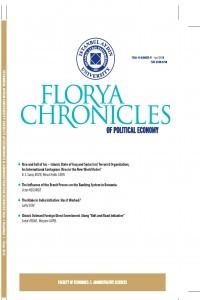Turkey’s Education Diplomacy With Africa
Turkey’s Education Diplomacy With Africa
The 21st century has witnessed the appearance of new diplomacy practices and non-state players, which has enhanced engagement between societies and shaped state policies by taking into consideration the outlooks and contributions of multiple stakeholders. This article argues that education diplomacy – which can be defined as an approach to develop education policies and achieve educational goals through the involvement of diverse stakeholders – furthers developmental efforts within societies. Within the education diplomacy framework, the article reviews Turkey’s recent opening to Africa and the role that education diplomacy can play as a tool in facilitating bilateral economic and humanitarian relations, as well as support of the developmental goals of African countries
Keywords:
Sub-Saharan Africa, Development, Public Diplomacy, Education Diplomacy Turkey-Africa Relations,
___
- [1] Africa Application and Research Center (AFRİKAM), (2015), Final Report of the Working Luncheon on Education Diplomacy with Africa. Istanbul: Istanbul Aydn University.
- [2] Altan, C. (2005). Afrika ülkeleriyle ekonomik ve ticari ilişkilerimiz. Uluslararas Ekonomik Sorunlar Dergisi, 17, 1- 20.
- [3] Aybar, S. (2006, February 1). Yeni Türk-Afrika ekonomik ilişkileri ve eski engelleyici söylem: Afro-pesimizim. In Türk Asya Stratejik Araştrmalar Merkezi. Retrieved on [February, 2016], from http://www.tasam.org/tr-TR/Icerik/4093/yeni_turkafrika_ekonomik_iliskileri_ve_eski_engelleyici_soylem_afropesimizm.
- [4] Back, G., & Afacan, I. (2013). Turkey discovers Sub-Saharan Africa: The critical role of agents in the construction of Turkish foreign-policy discourse. Turkish Studies, 14(3), 483- 502. doi: 10.1080/14683849.2013.832040.
- [5] Cull, N. J. (2010). Public diplomacy: Seven lessons for its future from its past. Place Branding and Public Diplomacy, 6(1), 11-17. doi: 10.1057/pb.2010.4
- [6] Dş Ekonomik İlişkiler Kurulu (DEİK). (2014). DEİK Ülke Özel Yaynlar: Afrika, 63.
- [7] Genç, S., & Tekin, O. (2014). Turkey’s increased engagement in Africa: The potential, limits and future perspectives of relations. European Journal of Economic and Political Studies, 7(1), 87-115.
- [8] Gregory, B. (2008). Public diplomacy: Sunrise of an academic field. The Annals of the American Academy of Political and Social Science, 616(1), 274-290. doi: 10.1177/0002716207311723.
- [9] GUNI, IAU, & AAU. (2011). The promotion of sustainable development by higher education institutions in Sub-Saharan Africa: Survey report.
- [10] Gündüz, O. (2012). Uluslararas burslu öğrencilerin Türkiye’de eğitim görme beklentileri ve kariyer hedefleri: Yurtdş Türkler ve Akraba Topluluklar Başkanlğ uzmanlk tezi.
- [11] Haşimi, C. (2014). Turkey’s humanitarian diplomacy and development cooperation. Insight Turkey, 16(1), 127-145.
- [12] The Istanbul declaration on Africa-Turkey partnership: Solidarity and partnership for a common future. (2008). In ISS Resource Centre. Retrieved on January 12, 2016, from https://www.issafrica.org/uploads/TURKEYAFRIDECAUG08 .PDF.
- [13] Karagül, S. & Aslan, İ. (2013). Türkiye’nin Afrika açlm politikas: Tarihsel arka plan, stratejik ortaklk ve geleceği. Uluslararas Hukuk ve Politika, 9(35), 21-55.
- [14] Nye, Jr., J. S. (2008). Public dipomacy and soft power. The Annals of the American Academy of Political and Social Science, 616, 94-109. doi: 10.1177/0002716207311699.
- [15] Özkan, A. (2015). Strategic practices of public diplomacy policies in educational field and Turkey’s potential for cultural diplomacy. Procedia – Social and Behavioral Sciences, 176, 35-43. doi: 10.1016/j.sbspro.2015.01.441.
- [16] Özkan, M. (2012). A new actor or passer-by? The political economy of Turkey’s engagement with Africa. Journal of Balkan and Near Eastern Studies, 14(1), 113-133. doi: 10.1080/19448953.2012.656968.
- [17] Özkan, M. (2010). What drives Turkey’s involvement in Africa? Review of African Political Economy, 37(126), 533- 540. doi: 10.1080/03056244.2010.530952.
- [18] Özkan, M., & Orakç, S. (2015). Viewpoint: Turkey as a “political” actor in Africa – an assessment of Turkish involvement in Somalia. Journal of Eastern African Studies, 9(2), 343–352. doi: 10.1080/17531055.2015.1042629.
- [19] Yurt dş ziyaretler. (n.d.). In Türkiye Cumhuriyeti Cumhurbaşkanlğ. Retrieved on [2016], from www.tccb.gov.tr/receptayyiperdogan/yurtdisiziyaretler/.
- [20] Sending, O. J., Pouliot, V., & Neumann, I. B. (2011). The future of diplomacy: Changing practices, evolving relationships. International Journal, 66(3), 527-542.
- [21] Shinn, D. (2015). Turkey’s engagement in Sub-Saharan Africa: Shifting alliances and strategic diversification. London: Chatham House.
- [22] T.C. Kalknma Bakanlğ: Kalknma Araştrmalar Merkezi. (2015) Yükseköğretimin uluslararaslaşmas çerçevesinde Türk üniversitelerinin uluslararas öğrenciler için çekim merkezi haline getirilmesi: Araştrma projesi raporu. Ankara: Türk Cumhuriyeti.
- [23] Turkey-Africa relations. (n.d.). In Republic of Turkey Ministry of Foreign Affairs. Retrieved on [date needed], from http://www.mfa.gov.tr/turkey-africa-relations.en.mfa.
- [24] Turkish Airlines again expands its network. (2015, December 15). In Turkish Airlines. Retrieved on [2016], from http://www.turkishairlines.com/en- int/corporate/pressroom/press-releases/press-release-detail/turkish-airlines-again- expands-its-network-661.
- [25] Turkish Cooperation and Coordination Agency. (2013). Annual Report 2013. Ankara: Government of the Republic of Turkey.
- [26] United Nations Development Program. (2015). Human development report 2015: Work for human development. New York: United Nations.
- [27] United Nations Educational, Scientific and Culrtural Organization. (1996). Report to UNESCO of the International Commission on Education for the Twenty-first Century – Learning: The treasure within. Paris: UNESCO.
- [28] Wheeler, T. (2011). Ankara to Africa: Turkey’s outreach since 2005. South African Journal of International Affairs, 18(1), 43-62. doi: 10.1080/10220461.2011.564426.
- ISSN: 2149-5750
- Yayın Aralığı: Yılda 2 Sayı
- Başlangıç: 2015
- Yayıncı: İstanbul Aydın Üniversitesi
Sayıdaki Diğer Makaleler
Relationship Between Political Instability & Growth In Some Selected Mena Countries
Turkey’s Education Diplomacy With Africa
Political Violence and Terrorism: Insight Into Niger Delta Militancy and Boko Haram
Özüm Sezin UZUN, Yusuf Saheed ADEGBOYEGA
Sanal Organizasyonların Yönetim Fonksiyonları Açısından Geleneksel Organizasyonlardan Farklılıkları
Psikolojik Sermaye Kavramı Üzerine Bir İnceleme
Development as Systems: Systems Frameworks, Sub-Saharan African Development, and Health Systems
Food Security And Drawbacks Of Neo-Liberal Food Policies
Lord Curzon and the Use of Secret Intelligence at the Lausanne Conference: 1922-1923
Economic Development In Africa: Salient Trends and Priorities
